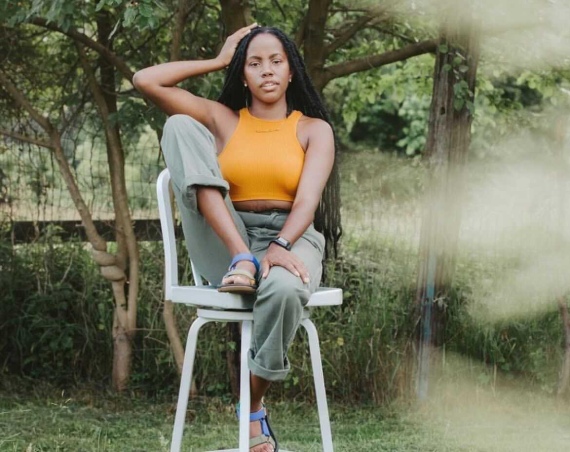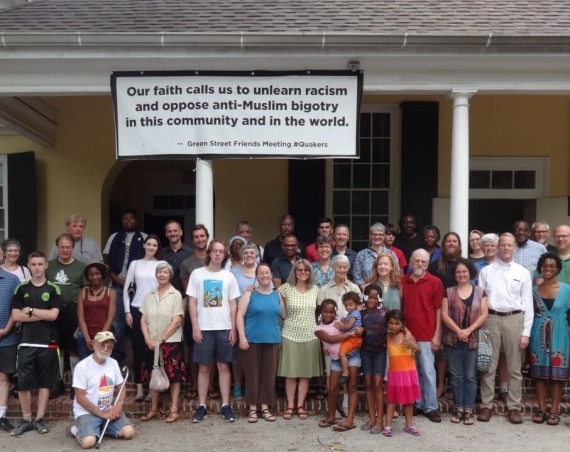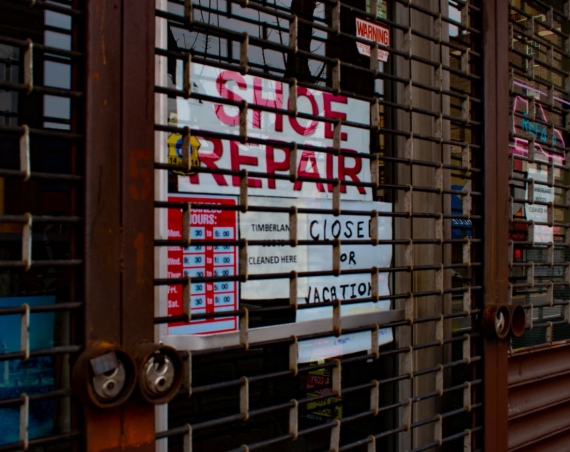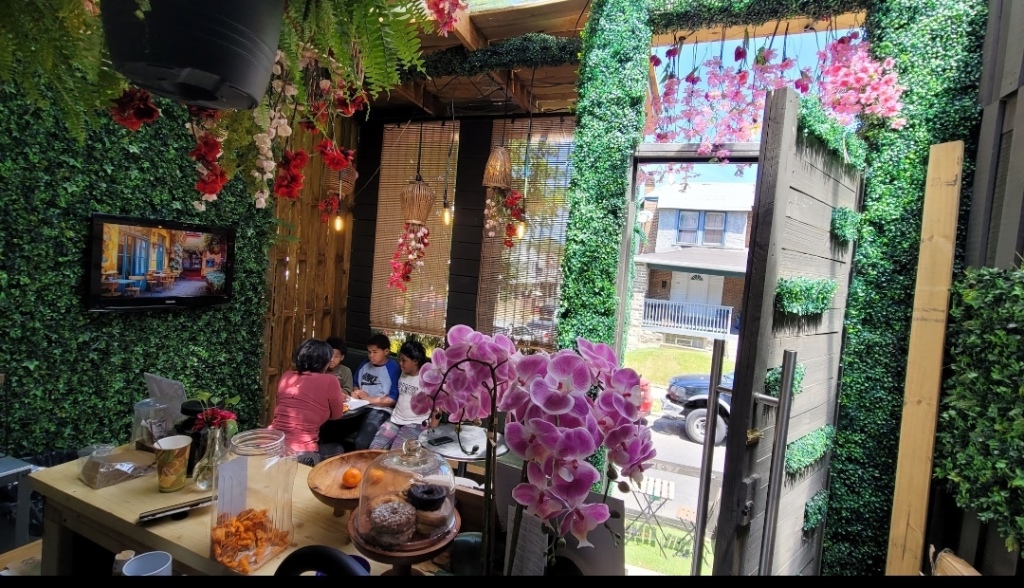
At St. Harmony Cafe, kids pick up litter. They plant and water trees. They make drinks. They serve their neighbors. And they learn to apologize. They treat each other and their land with kindness.
It’s a vision that Mekia Elizabeth and Raheim (Heim) Brown both wanted to see growing up, and they want to see it as adults in the neighborhood. So they work hard together and with their neighbors to make it happen.
With the help of the community, they started a pay-what-you-wish cafe and meeting spot on the porch of her childhood home on Fernhill Road, right down the block from Fernhill Park in Southwest Germantown. They use the proceeds from the cafe, almost like a perpetual bake sale, to go toward neighborhood improvement projects throughout the block.
It started with a neighborhood handyman named Al, who began cutting hedges, picking up trash, and doing other yard work. Folks weren’t always able to pay him, but Elizabeth asked him to help around the block. In exchange, she would cook him oatmeal with fruit from her kitchen. Instead of Al tracking mud through the house, Elizabeth thought it might be good to create a little spot on her porch where folks could come to eat and gather. It has since evolved into a beautifully designed space with donated materials, food, and drinks where local block captains, neighbors, and especially kids can hang out.
They named the place St. Harmony Cafe, each part of the name having significance. The saint is for servant leaders, to remind the younger ones that they can serve out of a heart space, which makes them leaders. Harmony is their driving virtue.
“Harmony is our virtue. So it’s just similar to the Barbie movie. All the kids are Harmony. Everyone’s like, hi, Barbie. Hi, Barbie. They all call each other harmony. Hi, Harmony. Hi, Harmony. Hi, Harmony. But the one who is most loving, the one who is most patient, most compassionate, that’s a Harmony,” says Elizabeth.
She continues, “Where the competition before was… ‘you can’t sit with us, Mean Girls’ kind of energy, now the energy is who can be the most loving, who can be the most patient, who can be the most compassionate?”
There are at least 20 kids on her block that Elizabeth and her partner would see regularly. Most of them are from families that have been in the neighborhood for generations, with grandparents passing down the houses to their children and grandchildren.
Elizabeth and Brown could see that the younger folks needed some guidance in emotional and relational intelligence. Brown works in behavioral health and is the dean at a charter school, and they both knew any love poured into them would positively affect the entire block because they were the heirs of the community. So they started different programs in and around the St. Harmony porch– an afterschool program, a playstreet for the summer, and a summer camp.
The goal is to love the kids to life, to give them a safe space, a space to be playful, and to have a childhood in a society they feel is run by aggression and egoism—the antithesis of love.
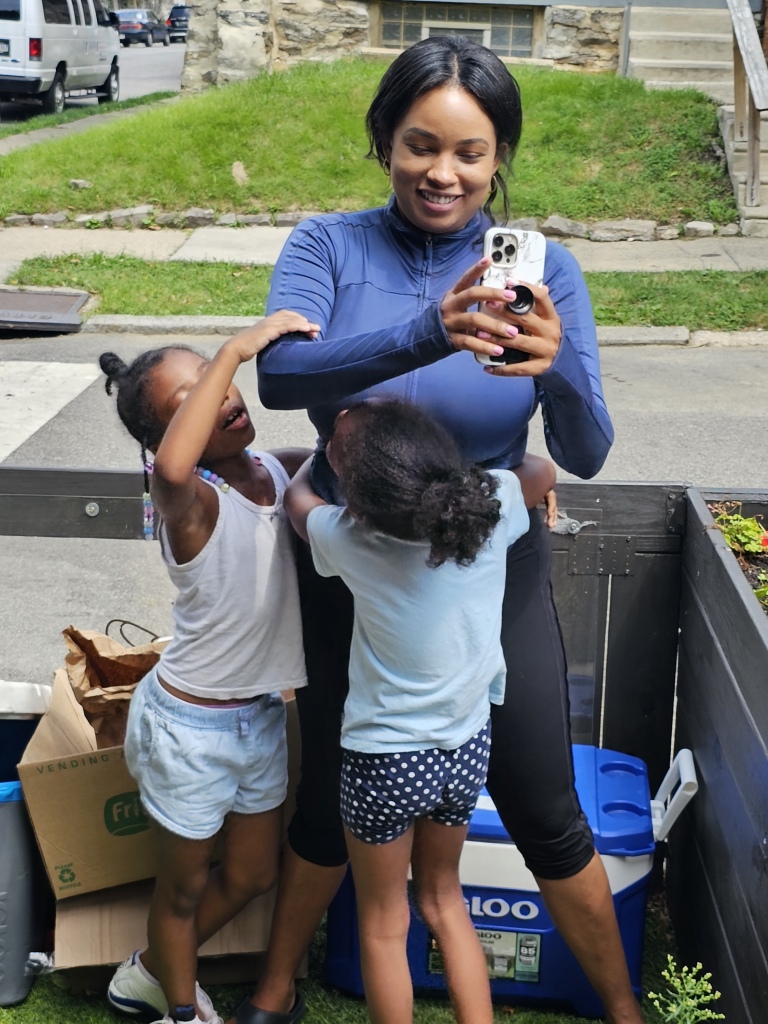
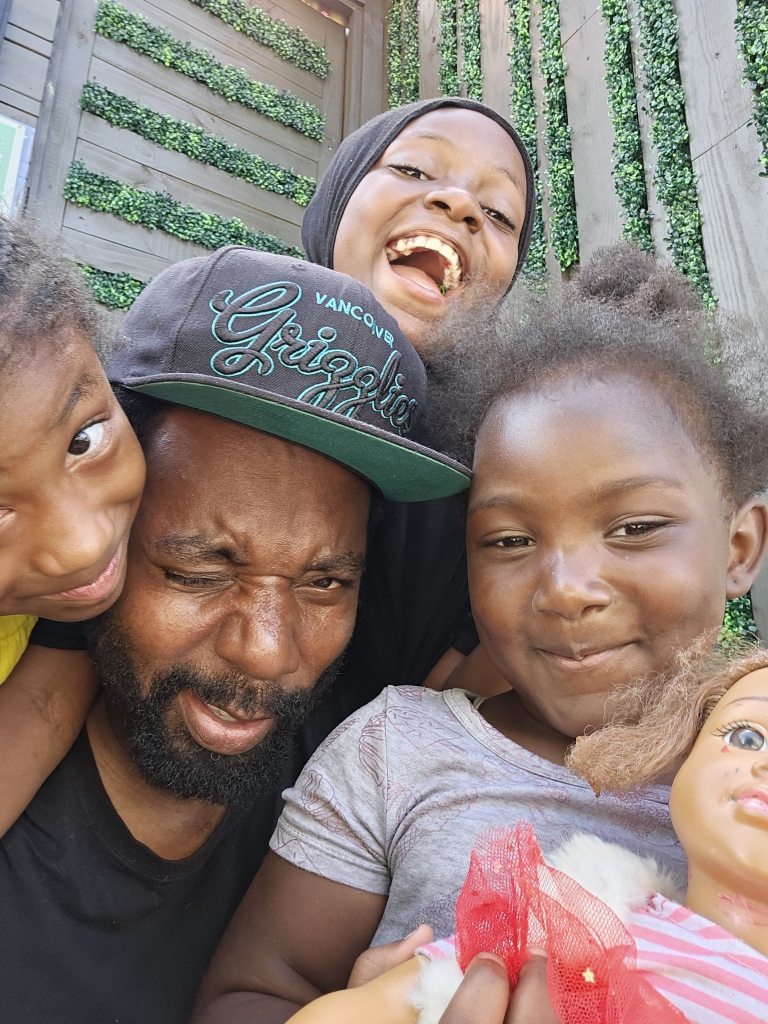
“It sounds crazy, but we’re doing it one hot chocolate at a time, one kissing of a booboo at a time, one bike at a time, one runny nose at a time, one day at a time. And we’re teaching them what it looks like to be in a community with people that you care for and how you care for the community, how you care for each other, and how you care for yourself,” said Elizabeth, who is the block captain and co-chair for the Friends of Fernhill Park.
The kids range in age, and all have different interests, but when asked what their favorite part of Playstreet or St. Harmony Cafe is, for many, it was having fun, feeling safe, and riding the bikes at the cafe. Two preteen girls said they loved going to the park every day and riding bikes. And what did they learn? Kindness, self-control, and learning to apologize. “That was big for me,” said 12-year-old Kourtney.
Seven-year-old Mahiyah’s favorite part was getting in water fights with Mr. Heim and Miss Kia, especially Miss Kia because she screams her name every time she sees her. Other kids said they just liked being together. Others said they learned about doing nice things for other people even when no one asked them.
Elizabeth and Brown both grew up in the area and have seen the changes in the park and the surrounding streets. The area has a mix of socioeconomic, racial, and ethnic demographics, and community building is not always easy or beautiful.
Elizabeth makes the point that it’s easy to love our neighbors when things are awesome, but it’s how you respond when there is conflict or when you are displeased with someone that can show a real practice in love.
One example is how some older neighbors were getting frustrated with the teens and older kids around the block. Elizabeth said things can get loud, and the younger and older kids can be rowdy and get wild. Older kids would hang out near people’s cars and play loud and vulgar music. They left trash everywhere. The adults were upset with them and against them in many ways. But as St. Harmony began to model a new way–a way to explore grace, patience, and learning–the adults started helping the kids in the same way. They all started seeing each other’s emotional needs.
Elizabeth talked about the perspective of the older kids. “And they’re also coming from a space of, why can’t I take up space? Why do I always have to make myself smaller? So that other people can be.” She continued,” It’s all valid, and in principle, they have valid concerns {from the older neighbors}. So again, just kind of giving them a container, giving them a new way to see.”
More neighbors started donating food and things for the after-school program and summer camp. They became involved in teaching the younger folks how to be stewards of the neighborhood. Elizabeth said they don’t have to wait to see it—it’s happening now.
“Our kids pick up the trash on the block. Our kids planted the trees on the block. Our kids water the trees, tend the gardens. They run Fun Friday (a monthly celebration in the park to connect neighbors). They run the cafe. They deliver treats and things to the neighbors who are sick and shut in. So they are in a space of being able to see the kids in a different way because of the structure that we provided and the opportunity that we’ve given them,” said Elizabeth.
Elizabeth and Brown both understand what it feels like to grow up without certain family structures. For Elizabeth, it was being a teen mom estranged from her biological family, and for Brown, it was being without parents. They want to help build support systems they lacked growing up, and they stress the importance of starting small, starting right where you are, and building things together.
“Like, can we just start here? Can we just make this a safer place here? A more loving place? A place where you’re visible, a place where we look out for each other, a place where you don’t have to be perfect? A place where we’re patient in affliction. Like, it’s hard. It’s hard, but when you do it together, it’s richly rewarding,” said Elizabeth.
Brown’s tips for other blocks and neighbors to start connecting are simple: Just go hang out with the kids. “Just go outside, introduce yourself to the kids, and play with them. Once you play with them, you get to know them. You get to see what they like to do. You can play a game of football. Well, once you get that connection, they’re all yours,” said Brown.
“Start with a game of football. The next thing you saying, ‘Hey, man, why did you throw that piece of trash on the ground?’ He’s like, ‘My bad, mister, here, I’m gonna pick it up.’ Then you go from there,” he continued.
Elizabeth agrees. Her main tip is to be patient and wait for the seeds to grow. As co-chair of the Friends of Fernhill Park, which is growing a food forest, she knows things take time. Trees will take years to bear any fruit. Her other tip? Use your specific skills to foster community. She has been a professional event planner for years and knows how to work on teams with many different people.
“Whatever your gift is, just do that. Don’t try to be what you’re not. Just be who you are and give your gift. And by giving your gift, it will activate other people to come and share their gift,” says Elizabeth.
And she says don’t forget to find other people to help. She suggests not making big promises but instead to share big visions and ensuring that there’s space and adaptability to work together even when it’s messy.
She and Brown make sure to remind folks that they aren’t the key to the harmony and peace they are trying to invoke–it is everyone together.
“A good leader helps people find their place. Like, everyone has something they’re already sent here to do. Your job is to help them figure out what that is and, encourage them around it, and help them develop their skills. So it’s like, we say ‘better together’ and we mean it. We mean it,” said Elizabeth.
“I’m just one part of it, but everybody has to show up for us to really function and be healthy and whole.”

